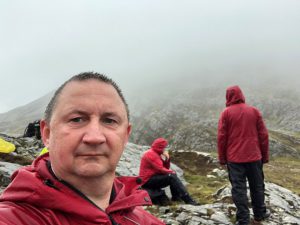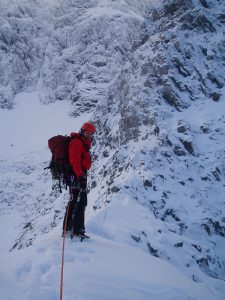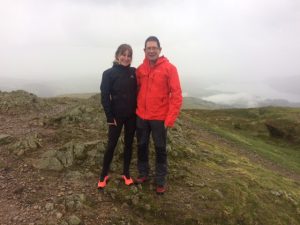Meet our Volunteers

Meet our Volunteers
Name: Gordon Binnie
Age: 49
Job: IT Engineer
Team: Oban MRT
Why did you join the Mountain Rescue?
I was one of the original gang of 3 who set the wheels in for motion just over 20 years ago to setup Oban MRT. It seemed the right thing to do at the time, there was a gap in the rescue coverage in the area and as an active mountaineer it seemed the right thing to be involved in and put something back.
What are the good & bad bits about being in Mountain Rescue?
Good bits are the camaraderie, getting out on the mountains at all times of days and nights and experiencing some amazing views and visiting some really out of the way locations. As your out in all weathers the extremes can be breathtaking, incredible sunsets and sunrises, moonlight traverse of Munros under perfect neve, to trying not to get blown of your feet in 100mph winds at midnight on a Munro on Boxing Day. Dealing with tragic circumstances is also hard, but knowing that your making a difference for families helps to offset that. Finding somebody safe and well or rescuing someone and seeing them make a full recovery is always good.
What’s it like to be part of team?
It’s amazing to be surrounded by folk who all play a part in helping people in need on the mountains. In adversity and difficult circumstances everyone pulls together, the training kicks in and the team performs as one with everyone finding hidden strengths and growing as a team
What is like to be on a call out? How does it make you feel? How does leaving your loved ones in a moment’s notice make you feel?
Callouts are generally a huge roller coaster of emotion. There’s the adrenaline rush as you run out the door, get to the MR post or RV. As you then slog up the hill, carrying huge loads, no matter how fit you are, you still can’t keep up with the really fast folk and you start to feel crap, useless and start to reflect on the chaos you’ve left at home or work. You feel your not good enough and that MR is not for you anymore…. Then you get onscene with the casualty, you find your only 2 mins behind the fast guys, you’ve gone from bathing your baby to the top of a Munro in well under 2 hours, you’re carrying the crucial bits of kit needed, all of a sudden you find yourself fully involved and are shocked to discover that you do know how a Kendrick traction splint goes on after all!
On the way off the hill after a successful search or rescue you reflect and know that you’re in the right place and that you are making a difference. Usually by the time you crawl back into bed you also discover that the wife is still talking to you and has been worried about you. After a brief 40 mins sleep your alarm goes off and its time to get up and organise kids for school and get to work.
I really enjoy being involved MR and hope I can carry on being involved for a good while yet. It’s a real privilege to be part of a unique and exclusive group not just in our own team but across MR everywhere.
___________________________________________________________________________________________
Name: Kev Mitchell
Age: 57
Job: Technical Manager
Team: Ochils MRT
Why did you join the Mountain Rescue?
In 1992 I started off as a dogsbody for a friend who was training a search dog, I was approached by folks in the Ochils team and invited to come along – astonishingly I am still in the team and just stood down after 14 years as team leader.

What are the good & bad bits about being in Mountain Rescue?
Helping folks in difficulty is a huge privilege and the camaraderie in most teams is a vital part of the wellbeing of the team. The training and personal development is a fantastic by product of team membership and of course having a sense of humour is important……I am renowned for my fantastic puns and am very consistent – not funny but consistent!!
Obviously we have to deal with difficult and challenging situations and although we deal with serious injuries and fatalities we do so with respect and empathy but dealing with relatives can be very emotionally very difficult.
What’s it like to be part of team?
Teamwork is the key to Mountain Rescue throughout the world, as volunteers it is even more important to have the feeling of being part of a bigger whole. No one person can complete a full rescue, we all play our part to achieve the best outcome possible for the casualty and I think the vast majority of team members value teamwork highly.
What is like to be on a call out? How does it make you feel? How does leaving your loved ones in a moment’s notice make you feel?
When the text arrives there is a surge of Adrenalin, what is the situation, where is the RV, what gear do we need, do we need support from helicopters, dogs, other teams or agencies, lots to think about before I even get to the post. I am usually very focused on incident planning and making sure we get the right resources to the right place as soon as possible for the benefit of the casualty. I have missed quite a few family celebrations, meals, trips on mountain bikes etc etc, I think most of our family members are massively supportive and understand why we volunteer to do this work but there is still an awareness that we are leaving to potentially put ourselves in tricky situations.
Being in a Mountain Rescue team is a great privilege, being able to serve the MR community on the SMR exec is also a privilege and certainly an experience!! I have been fortunate to be surrounded by experienced rescuers who shared their knowledge and skills with me and I would be keen to show that support to others.
The most important quality to be involved in MR is a sense of humour and the ability to not take yourself too seriously!!!
In case there is any confusion I am the bloke on the right in the picture!! And yes, that is David Hasselhoff in the picture.
___________________________________________________________________________________________
Name: Ian Livingston
Age: 59
Job: Antique Restorer. I have been in the Galloway team since 1981 including a stint as team leader.
Team: Galloway MR T
T
Why did you join the Mountain Rescue?
I joined the team because when I was home from college in October 1978 I was involved in a helping with a search for my younger brother and some other scouts. The team had been out over night and the second wave of searchers didn’t know the area they were lost in, I had often been there so was able to help. When I returned home in 1981 I joined the team.
What are the good & bad bits about being in Mountain Rescue?
The good bits about being in the team are helping people , giving something back to the climbing/ walking community and the camaraderie that goes with it. The bad parts are the occasional fatalities and that as part of a small community sometimes they are friends that you are recovering.
What’s it like to be part of team?
Similar to work mates or climbing partners there is a closeness that comes from working and sometimes struggling together against adversity that binds you together as a team.
What is like to be on a call out? How does it make you feel? How does leaving your loved ones in a moment’s notice make you feel?
Call outs are different depending on whether someone is in danger for their life in which case there is a lot of adrenaline or whether it is an evacuation which might just be physically draining, it always takes some time to come down after a call out regardless of what time you get back at.
I always try to make a judgment as to how leaving my family to go on a call out will affect them but they also know that if someone’s life is at risk I will go, but I do use almost 40 years of experience to filter what makes me jump.
Over the years the type of call out has changed, with satnav and mobile phones people tend not just to be lost and if they are overdue they can check in but it still gets dark and cold and too bad for helicopters to fly so we are still needed.
___________________________________________________________________________________________